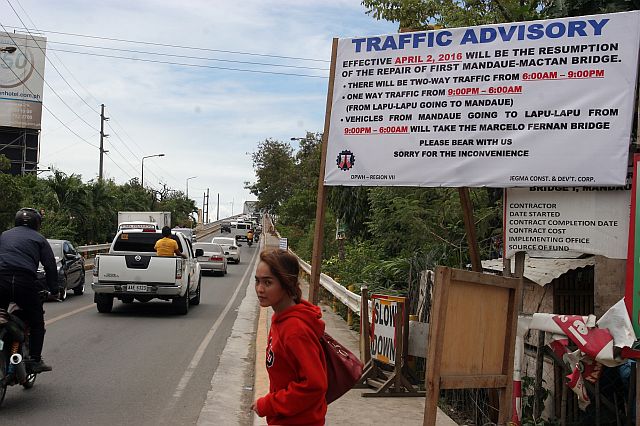
A big sign informing motorists of the schedule of bridge closure is set up at the foot of the Mandaue City side of the first bridge. (CDN PHOTO/JUNJIE MENDOZA)
The traffic management body of Lapu-Lapu City should set up signs to inform motorists that the first Mandaue-Mactan Bridge is open to vehicular traffic during the daytime.
Florentino Nimor Jr., Traffic Enforcement Agency of Mandaue (Team) director, said he will make the suggestion to his counterpart in Lapu-Lapu City to help ease heavy traffic congestion on the second bridge (Marcelo Fernan Bridge).
Nimor said since the start of the bridge repairs on April 2, motorists have been avoiding the first bridge because they thought this is closed for most of the day, and when this is opened to traffic, only one lane will be provided for motorists.
“Wala man gud mahitabo ang pagpasira sa bridge igka buntag. Normal ra man pud except (Wednesday). Unpredictable man gyud ang traffic (No road closure during daytime. The traffic is normal except last Wednesday. The traffic is always unpredictable),” he said.
Nimor said traffic congestion at the second bridge has been heavy as more motorists use it.
Nimor encouraged northbound and southbound motorists to continue using the national highway, or the M.C. Briones-Lopez Jaena route.
Those bound for Lapu-Lapu City, especially the Mactan Cebu International Airport (MCIA), should pass through Ouano Avenue then to A. Soriano Avenue and turn left to DM Cortes Street then to the UN Avenue and finally to the Marcelo Fernan Bridge.
NEW SYSTEM USED
Meanwhile, project site engineer Mike Cabarrubias of the Department of Public Works and Highways (DPWH) said they are using a new system to hasten the repairs of the bridge.
Cabarrubias said instead of removing the bridge’s deck slabs and replacing it with new ones, which will take a year to complete, they will just inject epoxy and apply carbon fiber in the slabs to reinforce and strengthen them.
Cabarrubias said this would shorten the repairs to only about five months.
He said Jegma Construction and Development Corp., contractor of the P129-million project, has scraped off the asphalt of one lane of the 854-meter bridge.
He said this means that they are already 20 percent done with the project.
DPWH 7 project engineer Danilo Pasicaran said injecting epoxy and applying carbon fiber on the deck slabs do not mean that the slabs will be as good as new but these will reinforced and strengthened.
“Taas nag life. Kay ang particle nga gikan sa dagat nga maoy maka-dilapidate sa deck slabs dili naman makasulod, murag mo-seal sya. Mo-last na probably og 50 years kung walay any untoward incidents usab (The slabs will have a longer life because the particles from the sea which can weaken the deck slabs can’t enter the slabs anymore. The slabs will probably last for another 50 years barring any untoward incident),” he said.
The process for the repair of the deck slabs alone will be done in two to three months.
Pasicaran said with this new repair scheme, one lane of the bridge will continue to be closed from 9 p.m. to 6 a.m. until the slab repairs are done.
With the new system, the project cost will be a little bit lesser than the P129 million, he said.